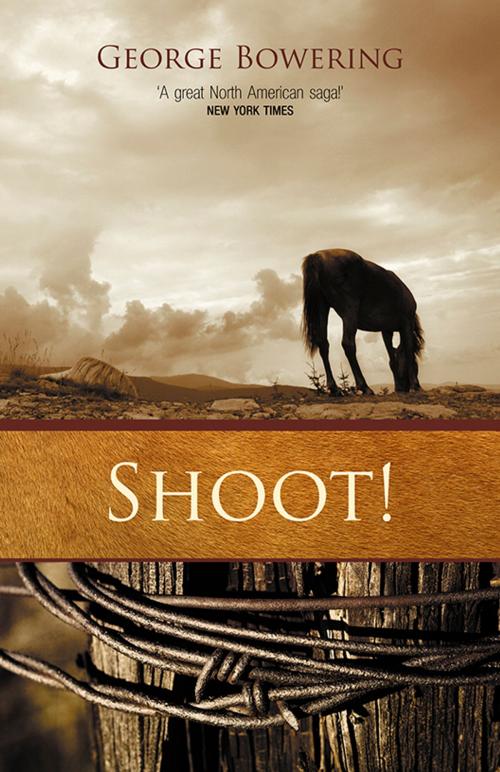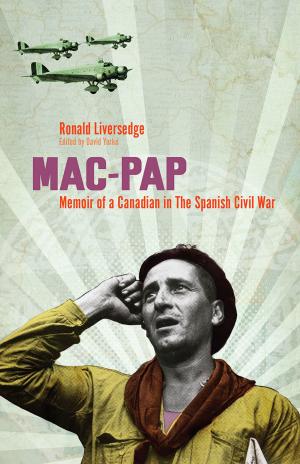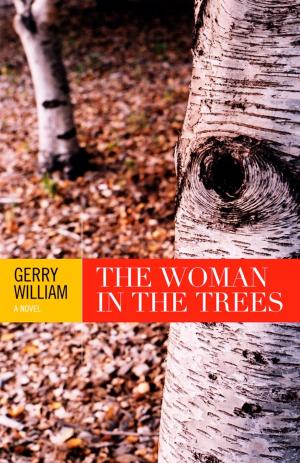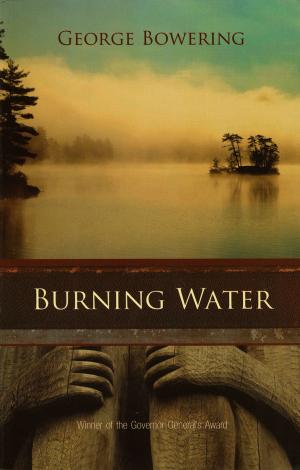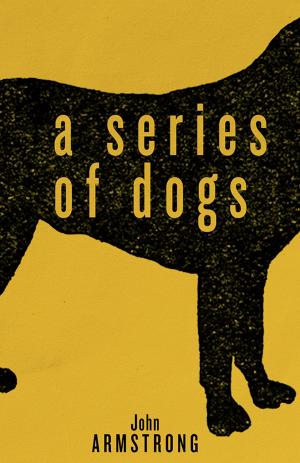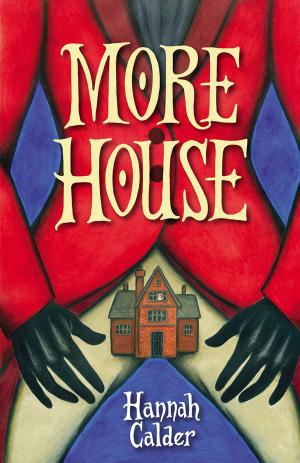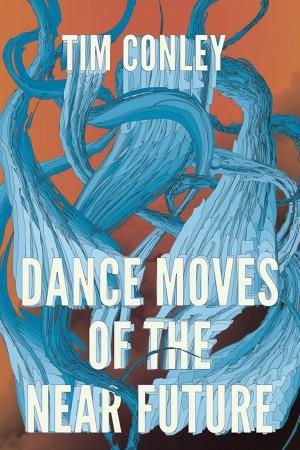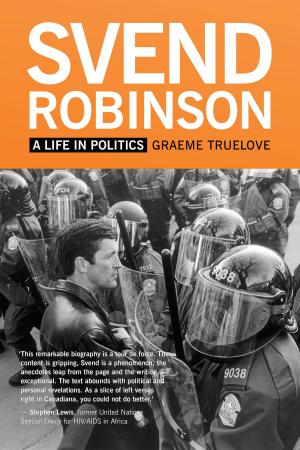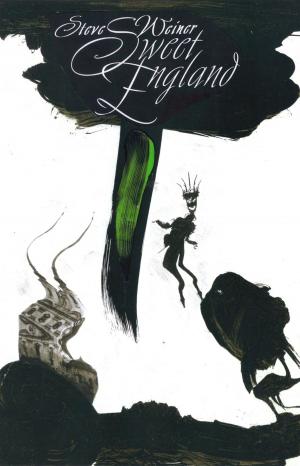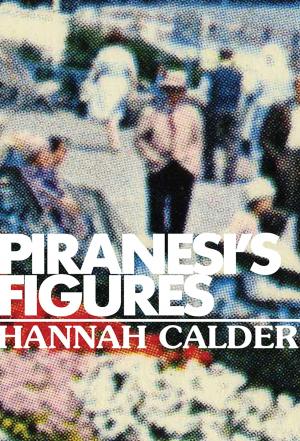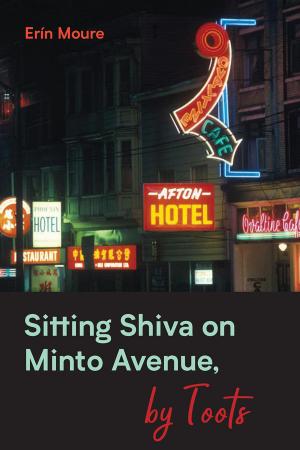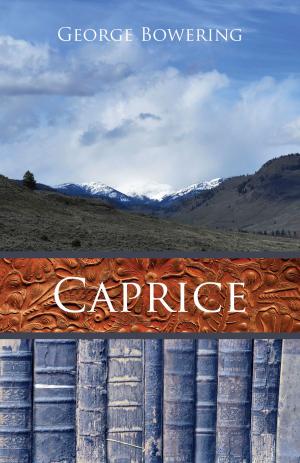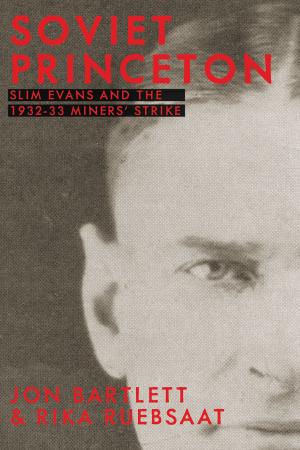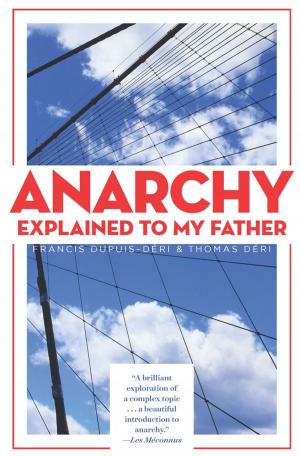| Author: | George Bowering | ISBN: | 9781554200818 |
| Publisher: | New Star Books | Publication: | January 8, 2014 |
| Imprint: | Language: | English |
| Author: | George Bowering |
| ISBN: | 9781554200818 |
| Publisher: | New Star Books |
| Publication: | January 8, 2014 |
| Imprint: | |
| Language: | English |
Cowboys and Indians, sometimes one and the same, occupy the rugged landscape of the late nineteenth-century British Columbia interior in George Bowering's Shoot! Meet the McLean Gang — brothers Allan, Charlie, and Archie — and their sidekick Alex Hare. Halfbreeds who grew up bitter outcasts, rejected by both white and Indian worlds, they roam the ranch country around Kamloops on a wild spree of cattle rustling, robbery, and mayhem. Until the day they go too far and kill two men in cold blood, one of whom is the local sheriff. Tracked and captured by a posse of over a hundred men, the McLean Gang — the youngest a boy of fourteen — were tried, convicted and hanged in short order.
Originally published in 1994, Shoot! is a compassionate tale of race relations in the interior of British Columbia in the 1800s. Told with humour and sensitivity, George Bowering's imaginative re-creation of the world of the real-life McLean Gang soars into the realm of exhilarating speculation.
With an Afterword by Sherrill Grace.
EXCERPT:
Chapter 1
THERE WERE THREE BROTHERS walking around the dry country, doing their best to change things. The sun was beating on their heads, but they had a job to do. The sky was wide and blue, just as it is today. Red willows grew beside the river. There was not much in the way of green, except high on the hill where the pine trees stood apart from one another. In a few months there would be a lot of white on practically everything.
The three brothers were changing things so that the new people could live there.
The country was full of people-killers, so Thlee-sa and his brothers had to be sharp. If the new people were going to make a go of it, they could not always be looking over their shoulders for people-killers.
Ike Willard said that in those days Rabbit was a people-killer. Ground Hog was a people killer. Thlee-sa and his brothers fixed things so that when the new people came they could kill rabbits to make tobacco pouches for themselves and meat for their dogs. They fixed things so that their dogs would chase ground hogs into their holes.
Ike Willard knew what he was talking about.
Thlee-sa and his two brothers spent the last part of their lives putting things in order for the new people. When they werent working they were camped at Kamloops, because tobacco grew there. They would sit and smoke their pipes and cook fish because that is where they kept their fire.
They were always working, changing things for the new people who would not be animals at all.
ARCHIE MCLEAN WAS FIFTEEN years old, he figured, and he was sitting in a jail cell, waiting to get hanged. He wasnt old enough to be anything but tough. It took a lot of guns to get him here, a lot of guns and a government. The government was made of rich men with names something like his. He was famous.
But he was shut up in the Provincial Gaol in New Westminster. Allan had a plan. Allan was able to see things, he said, and who wouldnt believe him? Right now, Allan, what does the river look like? What colour are the aspens? Who are you talking to?
Allan McLean was sitting in his own cell with his jacket buttoned, and there was a young woman sitting on a kitchen chair outside his cell, reading the paper to him. The paper is all about how outraged the citizens are that those outlaws are getting a new trial. She’s the same age as Allan, about, but she’s married to her husband, so her name is Mary Anne Moresby. Moresby is the warden of the Provincial Jail in New Westminster.
Mary Anne Moresby is the first woman who ever sang songs for Archie McLean.
“If you’re finished reading that there noose-paper, ma’am, would you sing a song for us?” This was Archie. He was the youngest, but he was tough enough to be funny.
And she sang.
She was twenty-three years old, and had a collar that came up to just under her ears, and hair piled up in light brown curls that she must have done herself because they were better in front than behind. She stood up and put her hands together behind her back and rotated her body a little as she sang.
Thou dear companion of my early years,
Partner of all my boyish hopes and fears,
To whom I oft addressed the youthful strain,
And sought no other praise than thine to gain —
There was very little light in that place, but Archie saw Mrs. Moresby’s eyes as she sang. They were not there, not anywhere in there, a little like Allan’s eyes when he was talking about the things he could see.
Archie was going to die without ever doing whatever you do with a girl. Allan had a wife at Douglas Lake, and a son, and now he was going to have another boy, he said. His son would be born the same year Allan died. Archie was born the same year his father died. The McLeans were like that.
THEIR MOTHER WAS ALWAYS telling them what the McLeans were like. This was always confusing, or it should have been. She always told them to fight back against anyone that wanted to take what was theirs, put them in jail, insult the family.
“Your father died fighting,” said Sophie. “I expect you not to give in to them.”
But their father died fighting Indians. They were now fighting white men who kept coming from Scotland and taking the best country along the rivers.
“You’re McLeans,” said Sophie.
They looked at each other’s faces, and saw McLeans. There were McLeans, they knew that, in Scotland, but they would never see them. The McLeans in Scotland would have white faces like their father’s face.
Archie did not remember his father’s face. As far as he was concerned all the McLeans had dark faces, and that was the way he liked it.
“Are we white men?” he asked his mother.
His mother was pulling the warm stuff out of a chicken with no feathers. She was wearing a dark dress that came up to her chin, and an apron over the dress. Her hair was done the way the white women in town did their hair.
“You are McLeans,” she said. That was supposed to be enough.
“Are you a McLean?” asked Archie.
He was a troublesome teenager. But he had been riding horses since he was three years old, and he had been working on other people’s ranches since he was nine. He wore boots that had once belonged to a man twice his age.
“My name is Sophie McLean,” said his mother. “Your name is Archie McLean. You can write your name,” she said.
They taught him how to write his name at the school in Cache Creek, the town named after something his father did.
“Our father died fighting Indians,” said Archie. “We fight Indians sometimes, but one at a time. Most of the time we have our troubles with white men.”
Sophie separated the parts of the chicken stuff she wanted to save and handed the bucket with the rest in it to her son.
As usual there was a dog at the door, lifting its muzzle, hoping.
“Donald McLean had his troubles with white men,” said Sophie. She had a large knife in her hand.
THE GEESE FLEW NORTH every day and into the early darkness. Large bodies in the air, like people, heavy in the air, a sky full of them day after day. They made a whistling sound, a whisper that anyone who was quiet could hear.
Two Wasco men listened to the large birds in the darkening sky. Nothing was more important; how could it be?
There was no story they knew about the soft whistling that filled the air for a while and fell to the earth so they talked about it.
“That sound comes from their wings,” said one man.
“No, it is a sound that comes from their beaks,” said the other. “If we were men flying heavy through the air we would grunt with the effort. We would gasp.”
“We would labour to move our wings, our arms,” said the first man.
“Such labour would make us breathe heavily.”
They listened as another flock of geese whispered by, barely visible in the low shadowed air.
“I hear their big wings flapping, the air whispering as they move, like paddles in the river,” said the first man.
“You are as stupid as the hard ground,” said the other.
“Wings.”
“Dumb as dirt.”
DONALD MCLEAN HAD TROUBLE with everyone, with Indians, with white businessmen, with his own families, with the Hudson’s Bay Company. He was a pillar of the community but he was a nasty man, cruel and self-important.
He was born, conveniently in 1800, at Tobermory on the Island of Mull. It was a very old place that was just getting started. Like most people, he left to go somewhere where he would no longer be a hopeless case. He wanted to become powerful.
Donald McLean worked hard and never smiled and got to be in the room when it was handy to be there, and fought his way up the ladder inside the Hudson’s Bay Company.
The Hudson’s Bay Company built trading posts called forts and asked the Indians to come in with furs. In exchange for the furs the Indians were given items of European manufacture that were in Europe deemed far less interesting than furs. Rich fat men in London wore beaver hats, and thin Shuswap men in Kamloops carried rifles that would not shoot straight.
Years later Donald McLean’s sons had quite a few rifles. Local people were surprised to see how well they could hunt with rifles that white men would not tolerate.
Donald McLean worked hard and in front of the right people, till he became Chief Trader at Fort Kamloops, in the district called New Caledonia. He seemed to hate everyone. He shared a nineteenth century European notion that the world he had come to was a vast disorder that could be organized with the application of strength and will. He went and got himself a second wife. He never learned a word of her language.
THE GEESE CONTINUED to fly overhead. North they went, whispering through the sky. And the argument continued. It was accompanied by angry facial expressions and unkind words. The man who said wings got together with his immediate family and some friends and explained his point of view. Soon there were quite a few people who argued for wings.
There were also quite a few people who argued for beaks. Sometimes the argument was made of reason. Sometimes it consisted largely of scornful laughter, and in the case of the middle-sized children, of shoving and tripping and name-calling. If there had only been an old story about the whispering of the geese, there wouldnt have been any of this trouble.
But among these people there was a traditional desire to stay away from big trouble, so a few of the more level-headed people on each side of the dispute took the problem to their Chief. He listened and retired to his sweat house beside the creek that emptied into the big river.
“Wings,” he could have heard people saying outside the sweat house.
“Beaks,” too.
Early in the morning, while the first light was showing how high the clouds were going to be that day, he stepped out and stood in front of the sweat house. Geese were going by, unseen yet, but whistling by the hundreds.
Later that morning he put on his medium-important clothes and called together the first two disputants and their brothers and his own immediate family.
“Beaks,” he said.
“Hooray,” some of the people shouted. A brother of the original beak theorist began to whistle through his teeth.
His opponent was moved by the disappointment and anger of his faction, and demanded a Council. Such were the traditions of these people that a Council was called, to deal with the issue fairly.
“What will we do,” said the wing man’s wife, “if the Council decides for them rather than us?”
Her husband looked around the settlement, at the slow green river gathering itself. In the north it had plunged white between stone walls. He saw the bright sun removing the last of the morning clouds. Tiny in the sky an arrow of geese flew northward, too high to be heard.
“The Council cannot decide against wings,” he said. He sounded confident, as he was brought up to be. He was a man of the river people. But she saw that this morning he had been counting his arrows, checking each for its workmanship.
That evening, with the proper fire, and after more than the usual number of fresh fish inside them, the Council met and listened to every word of the arguments. Every person who desired to speak was listened to. Then the people whose job it was to decide matters spoke, not among themselves, but to everyone there.
Beaks, they announced.
IF DONALD MCLEAN had heard this story he would have sneered. Geese are geese, put on this earth for use of God’s people if they happened to want them. Not as good eating as grouse or pheasant.
If Donald McLean had heard the story about the geese he would have said “Isnt that just like an Indian, to argue about such a thing?”
His wives would have kept quiet.
ALL RIGHT, SAID the defeated wing supporters, we know what we are listening to when we hear the geese going north, and we cannot stay and be surrounded by tyranny and error. We are leaving.
They followed the great river until they found a place far enough away and good enough to live in. The following spring they travelled some more. So every year they travelled, looking for a really good place. They met other people on their way, and traded stories and food. Occasionally someone would decide to marry someone and learn a new language. At other times someone would fall in love and join their group, bringing a little extra language and new stories.
So they went from year to year, up the side of the river, until they came to a beautiful place where another river entered, and they stayed for the winter. In the spring they went north along the side of this smaller river. They were in a valley of brown grass with walls of striped rock on either side. They ate the fish from the river as they went. In another year they found another river meeting this one, and they followed the new river, north.
This was a very beautiful river, shallow, with fast water over round stones. The fish in this river were smaller and better tasting.
“I am really glad I was on the wing side,” said one young man.
“Me too,” said his young wife. She was as beautiful as the river.
“But you werent even there,” said her young man. “I met you one river away from home.”
“Home? What is home?”
“No, I mean you were never at the argument. When we met I could hardly understand what you were saying.”
“You quickly found a way to overcome your linguistic difficulties,” said his wife, pretending to blush.
“So how could you be glad to be on the wing side of the argument?”
“No. You said that you were glad to be a wing enthusiast,” she said, looking down to see what he was doing with part of her body. “I was agreeing. I am glad that you left that place.”
“Home,” he said.
“That place.”
IF YOU WERE LOOKING at a map of the wing people’s sojourn, you would say that so far they have travelled up the Columbia River to the mouth of the Okanagan River, and up the Okanagan to the mouth of the Similkameen River. They went up the Similkameen for a year or two, till they found a place we call Keremeos. At Keremeos there is a conical mountain on the side of which is a huge letter K made by ancient shale slides.
THE PLACE they found was at a turn of the sparkling shallow river, under a mountain the local people called Chopaka. These were some Okanagan people who called the newcomers En-koh-tu-me-whoh, and treated them very well.
So for some years the two peoples lived together, married each other, and told each other’s stories.
THE GREAT OKANAGAN writer Mourning Dove says that the southern strangers’ women were fair and pretty.
She says that the Keremeos Indians taught the strangers their language, and the strangers taught their hosts how to make pit houses for the winter.
This is the way the Shuswap people responded to newcomers.
They would be that way when the white fur traders came too.
SOME YEARS LATER the people from the south left again, without an argument. They left with their two languages and their new children, and travelled north again, up the glistening Similkameen until they found smaller waters. They went as far north as they ever would, and over time they became the Nicola people. They began to forget their grandmothers’ words, but they remembered some of the stories.
They remembered the story of the geese’s wings.
THOSE WASCO PEOPLE werent the only strangers to come into the country, as we all know. Not much later the Yankees came up from the south too, up through the dry Okanagan valley and down the other river they called the Thompson. When they got there the Kamloops people showed them how to find animals and such.
“Is there anything else you need?” an Elder asked the white men.
“Well, where can we find some — ”
“What? Some what?”
“Well, you know — ”
“Tell us,” said the Elder, baffled by the unusual reticence in the newcomers. “You know that we like nothing better than to help people far from home.”
The white men looked at the ground. One of them drew semicircles in the earth with his toe. There was a snicker from someone in the back of the group, or the first half of a snicker.
“Well,” said one of the white men. “We have been away from Fort Astoria for many months.”
“White man mighty traveller,” said one of the Kamloops people noted for his humorous attitude.
“So, uh, naturally we havent had an opportunity to meet any women, you know what I mean, for social purposes.”
Now their hosts got it.
They stepped away from the fur traders and formed a group of their own. Once in a while the white men would see one or two of them look over toward them, but they could not hear what the Indians were saying.
One of the Indians was saying “You should remember what happened when the Chilcotins came over here pretending they wanted to play a sports tournament. These white men — maybe they only pretend that they want animal skins. Maybe the reason they came here was to get our women all along.”
“Oh, now really — ” began another.
“No, I mean it.” And now this man’s voice became really animated. “And think about this: if they can somehow manage to take our women, or some of them, even, maybe they will get the idea that they can take away our land.”
The others all laughed.
HERE IS WHY the McLean brothers and Alex Hare were in jail in New Westminster, where they listened to the warden’s wife singing songs made out of poetry.
One cold winter morning in 1879 they were camped among the trees overlooking the Nicola Valley, one young man and three boys full for the past few days of whisky and rum manufactured by the Hudson’s Bay Company.
Recently they had acquired a dandy horse that a rancher named Palmer thought was his. They had also acquired a lot of whisky and rum.
When Johnny Ussher, special constable, Government agent, tax-collector, jailor, assessor, Clerk of the County Court, Registrar of the Supreme Court, and mining reporter, rode into their camp, the McLean brothers and Alex Hare were liquored up against the cold and particularly interested in their own story.
Johnny Ussher thought they were just boys on a tear. He was a special constable without a gun.
By noon he was a corpse in the snow.
IKE WILLARD the story teller told us what happened to Thlee-sa and his two brothers.
They walked south along the river till they came to the place where it took a little bend and joined the other river. They crossed the river and found themselves in a place called T-kam-loal-pa. It was Things Getting Ripe month, and they picked as much tobacco as they needed, and sat around smoking for a while.
Salmon went by them, eastward. The sun beat down hard. They smoked their pipes.
Then they walked east with the salmon. They camped at a place called Hu-su-loat. There they smoked their pipes and thought about all the work they had done, creating order. They felt pretty good about the job they had done.
Early in the morning Thlee-sa got up before the others and went for a walk, checking the condition of the berries, looking to see that there were plenty of the plants required when people get sick. He was a few years older than his brothers, so he did a little more thinking than they did. He could see things that they had not learned to see yet.
He saw a young woman in a small clearing. She was dancing in the morning light. He watched her dancing for a while. Once he thought he saw her eyes fall on him for a moment, but then she continued to dance.
Thlee-sa went back and found his brothers just beginning to wake up.
“Come and see something,” he said.
“Something to which we have to give order?” asked one brother.
“Something to see,” said Thlee-sa.
So the brothers walked up the slope toward the small clearing and hid themselves behind a chokecherry bush. They watched the young woman dancing in the morning sunlight. She was wearing buckskin, and all over her buckskin were hanging tassels made of hair, in all the known colours.
Her eyes fell on them from time to time, as she danced. Their eyes fell shut, opened a little, fell shut, opened hardly at all, fell shut, and stayed shut. They slept in the morning sunlight.
The young woman danced around their sleeping bodies, and soon they were not people any more. They were three pointed mountains, side by side. They would last forever while the new people came into the valleys.
Just a little south and west of Monte Creek, you will be able to see them, Thlee-sa and his two brothers, covered with trees. You have to lift your eyes a little to see them.
Cowboys and Indians, sometimes one and the same, occupy the rugged landscape of the late nineteenth-century British Columbia interior in George Bowering's Shoot! Meet the McLean Gang — brothers Allan, Charlie, and Archie — and their sidekick Alex Hare. Halfbreeds who grew up bitter outcasts, rejected by both white and Indian worlds, they roam the ranch country around Kamloops on a wild spree of cattle rustling, robbery, and mayhem. Until the day they go too far and kill two men in cold blood, one of whom is the local sheriff. Tracked and captured by a posse of over a hundred men, the McLean Gang — the youngest a boy of fourteen — were tried, convicted and hanged in short order.
Originally published in 1994, Shoot! is a compassionate tale of race relations in the interior of British Columbia in the 1800s. Told with humour and sensitivity, George Bowering's imaginative re-creation of the world of the real-life McLean Gang soars into the realm of exhilarating speculation.
With an Afterword by Sherrill Grace.
EXCERPT:
Chapter 1
THERE WERE THREE BROTHERS walking around the dry country, doing their best to change things. The sun was beating on their heads, but they had a job to do. The sky was wide and blue, just as it is today. Red willows grew beside the river. There was not much in the way of green, except high on the hill where the pine trees stood apart from one another. In a few months there would be a lot of white on practically everything.
The three brothers were changing things so that the new people could live there.
The country was full of people-killers, so Thlee-sa and his brothers had to be sharp. If the new people were going to make a go of it, they could not always be looking over their shoulders for people-killers.
Ike Willard said that in those days Rabbit was a people-killer. Ground Hog was a people killer. Thlee-sa and his brothers fixed things so that when the new people came they could kill rabbits to make tobacco pouches for themselves and meat for their dogs. They fixed things so that their dogs would chase ground hogs into their holes.
Ike Willard knew what he was talking about.
Thlee-sa and his two brothers spent the last part of their lives putting things in order for the new people. When they werent working they were camped at Kamloops, because tobacco grew there. They would sit and smoke their pipes and cook fish because that is where they kept their fire.
They were always working, changing things for the new people who would not be animals at all.
ARCHIE MCLEAN WAS FIFTEEN years old, he figured, and he was sitting in a jail cell, waiting to get hanged. He wasnt old enough to be anything but tough. It took a lot of guns to get him here, a lot of guns and a government. The government was made of rich men with names something like his. He was famous.
But he was shut up in the Provincial Gaol in New Westminster. Allan had a plan. Allan was able to see things, he said, and who wouldnt believe him? Right now, Allan, what does the river look like? What colour are the aspens? Who are you talking to?
Allan McLean was sitting in his own cell with his jacket buttoned, and there was a young woman sitting on a kitchen chair outside his cell, reading the paper to him. The paper is all about how outraged the citizens are that those outlaws are getting a new trial. She’s the same age as Allan, about, but she’s married to her husband, so her name is Mary Anne Moresby. Moresby is the warden of the Provincial Jail in New Westminster.
Mary Anne Moresby is the first woman who ever sang songs for Archie McLean.
“If you’re finished reading that there noose-paper, ma’am, would you sing a song for us?” This was Archie. He was the youngest, but he was tough enough to be funny.
And she sang.
She was twenty-three years old, and had a collar that came up to just under her ears, and hair piled up in light brown curls that she must have done herself because they were better in front than behind. She stood up and put her hands together behind her back and rotated her body a little as she sang.
Thou dear companion of my early years,
Partner of all my boyish hopes and fears,
To whom I oft addressed the youthful strain,
And sought no other praise than thine to gain —
There was very little light in that place, but Archie saw Mrs. Moresby’s eyes as she sang. They were not there, not anywhere in there, a little like Allan’s eyes when he was talking about the things he could see.
Archie was going to die without ever doing whatever you do with a girl. Allan had a wife at Douglas Lake, and a son, and now he was going to have another boy, he said. His son would be born the same year Allan died. Archie was born the same year his father died. The McLeans were like that.
THEIR MOTHER WAS ALWAYS telling them what the McLeans were like. This was always confusing, or it should have been. She always told them to fight back against anyone that wanted to take what was theirs, put them in jail, insult the family.
“Your father died fighting,” said Sophie. “I expect you not to give in to them.”
But their father died fighting Indians. They were now fighting white men who kept coming from Scotland and taking the best country along the rivers.
“You’re McLeans,” said Sophie.
They looked at each other’s faces, and saw McLeans. There were McLeans, they knew that, in Scotland, but they would never see them. The McLeans in Scotland would have white faces like their father’s face.
Archie did not remember his father’s face. As far as he was concerned all the McLeans had dark faces, and that was the way he liked it.
“Are we white men?” he asked his mother.
His mother was pulling the warm stuff out of a chicken with no feathers. She was wearing a dark dress that came up to her chin, and an apron over the dress. Her hair was done the way the white women in town did their hair.
“You are McLeans,” she said. That was supposed to be enough.
“Are you a McLean?” asked Archie.
He was a troublesome teenager. But he had been riding horses since he was three years old, and he had been working on other people’s ranches since he was nine. He wore boots that had once belonged to a man twice his age.
“My name is Sophie McLean,” said his mother. “Your name is Archie McLean. You can write your name,” she said.
They taught him how to write his name at the school in Cache Creek, the town named after something his father did.
“Our father died fighting Indians,” said Archie. “We fight Indians sometimes, but one at a time. Most of the time we have our troubles with white men.”
Sophie separated the parts of the chicken stuff she wanted to save and handed the bucket with the rest in it to her son.
As usual there was a dog at the door, lifting its muzzle, hoping.
“Donald McLean had his troubles with white men,” said Sophie. She had a large knife in her hand.
THE GEESE FLEW NORTH every day and into the early darkness. Large bodies in the air, like people, heavy in the air, a sky full of them day after day. They made a whistling sound, a whisper that anyone who was quiet could hear.
Two Wasco men listened to the large birds in the darkening sky. Nothing was more important; how could it be?
There was no story they knew about the soft whistling that filled the air for a while and fell to the earth so they talked about it.
“That sound comes from their wings,” said one man.
“No, it is a sound that comes from their beaks,” said the other. “If we were men flying heavy through the air we would grunt with the effort. We would gasp.”
“We would labour to move our wings, our arms,” said the first man.
“Such labour would make us breathe heavily.”
They listened as another flock of geese whispered by, barely visible in the low shadowed air.
“I hear their big wings flapping, the air whispering as they move, like paddles in the river,” said the first man.
“You are as stupid as the hard ground,” said the other.
“Wings.”
“Dumb as dirt.”
DONALD MCLEAN HAD TROUBLE with everyone, with Indians, with white businessmen, with his own families, with the Hudson’s Bay Company. He was a pillar of the community but he was a nasty man, cruel and self-important.
He was born, conveniently in 1800, at Tobermory on the Island of Mull. It was a very old place that was just getting started. Like most people, he left to go somewhere where he would no longer be a hopeless case. He wanted to become powerful.
Donald McLean worked hard and never smiled and got to be in the room when it was handy to be there, and fought his way up the ladder inside the Hudson’s Bay Company.
The Hudson’s Bay Company built trading posts called forts and asked the Indians to come in with furs. In exchange for the furs the Indians were given items of European manufacture that were in Europe deemed far less interesting than furs. Rich fat men in London wore beaver hats, and thin Shuswap men in Kamloops carried rifles that would not shoot straight.
Years later Donald McLean’s sons had quite a few rifles. Local people were surprised to see how well they could hunt with rifles that white men would not tolerate.
Donald McLean worked hard and in front of the right people, till he became Chief Trader at Fort Kamloops, in the district called New Caledonia. He seemed to hate everyone. He shared a nineteenth century European notion that the world he had come to was a vast disorder that could be organized with the application of strength and will. He went and got himself a second wife. He never learned a word of her language.
THE GEESE CONTINUED to fly overhead. North they went, whispering through the sky. And the argument continued. It was accompanied by angry facial expressions and unkind words. The man who said wings got together with his immediate family and some friends and explained his point of view. Soon there were quite a few people who argued for wings.
There were also quite a few people who argued for beaks. Sometimes the argument was made of reason. Sometimes it consisted largely of scornful laughter, and in the case of the middle-sized children, of shoving and tripping and name-calling. If there had only been an old story about the whispering of the geese, there wouldnt have been any of this trouble.
But among these people there was a traditional desire to stay away from big trouble, so a few of the more level-headed people on each side of the dispute took the problem to their Chief. He listened and retired to his sweat house beside the creek that emptied into the big river.
“Wings,” he could have heard people saying outside the sweat house.
“Beaks,” too.
Early in the morning, while the first light was showing how high the clouds were going to be that day, he stepped out and stood in front of the sweat house. Geese were going by, unseen yet, but whistling by the hundreds.
Later that morning he put on his medium-important clothes and called together the first two disputants and their brothers and his own immediate family.
“Beaks,” he said.
“Hooray,” some of the people shouted. A brother of the original beak theorist began to whistle through his teeth.
His opponent was moved by the disappointment and anger of his faction, and demanded a Council. Such were the traditions of these people that a Council was called, to deal with the issue fairly.
“What will we do,” said the wing man’s wife, “if the Council decides for them rather than us?”
Her husband looked around the settlement, at the slow green river gathering itself. In the north it had plunged white between stone walls. He saw the bright sun removing the last of the morning clouds. Tiny in the sky an arrow of geese flew northward, too high to be heard.
“The Council cannot decide against wings,” he said. He sounded confident, as he was brought up to be. He was a man of the river people. But she saw that this morning he had been counting his arrows, checking each for its workmanship.
That evening, with the proper fire, and after more than the usual number of fresh fish inside them, the Council met and listened to every word of the arguments. Every person who desired to speak was listened to. Then the people whose job it was to decide matters spoke, not among themselves, but to everyone there.
Beaks, they announced.
IF DONALD MCLEAN had heard this story he would have sneered. Geese are geese, put on this earth for use of God’s people if they happened to want them. Not as good eating as grouse or pheasant.
If Donald McLean had heard the story about the geese he would have said “Isnt that just like an Indian, to argue about such a thing?”
His wives would have kept quiet.
ALL RIGHT, SAID the defeated wing supporters, we know what we are listening to when we hear the geese going north, and we cannot stay and be surrounded by tyranny and error. We are leaving.
They followed the great river until they found a place far enough away and good enough to live in. The following spring they travelled some more. So every year they travelled, looking for a really good place. They met other people on their way, and traded stories and food. Occasionally someone would decide to marry someone and learn a new language. At other times someone would fall in love and join their group, bringing a little extra language and new stories.
So they went from year to year, up the side of the river, until they came to a beautiful place where another river entered, and they stayed for the winter. In the spring they went north along the side of this smaller river. They were in a valley of brown grass with walls of striped rock on either side. They ate the fish from the river as they went. In another year they found another river meeting this one, and they followed the new river, north.
This was a very beautiful river, shallow, with fast water over round stones. The fish in this river were smaller and better tasting.
“I am really glad I was on the wing side,” said one young man.
“Me too,” said his young wife. She was as beautiful as the river.
“But you werent even there,” said her young man. “I met you one river away from home.”
“Home? What is home?”
“No, I mean you were never at the argument. When we met I could hardly understand what you were saying.”
“You quickly found a way to overcome your linguistic difficulties,” said his wife, pretending to blush.
“So how could you be glad to be on the wing side of the argument?”
“No. You said that you were glad to be a wing enthusiast,” she said, looking down to see what he was doing with part of her body. “I was agreeing. I am glad that you left that place.”
“Home,” he said.
“That place.”
IF YOU WERE LOOKING at a map of the wing people’s sojourn, you would say that so far they have travelled up the Columbia River to the mouth of the Okanagan River, and up the Okanagan to the mouth of the Similkameen River. They went up the Similkameen for a year or two, till they found a place we call Keremeos. At Keremeos there is a conical mountain on the side of which is a huge letter K made by ancient shale slides.
THE PLACE they found was at a turn of the sparkling shallow river, under a mountain the local people called Chopaka. These were some Okanagan people who called the newcomers En-koh-tu-me-whoh, and treated them very well.
So for some years the two peoples lived together, married each other, and told each other’s stories.
THE GREAT OKANAGAN writer Mourning Dove says that the southern strangers’ women were fair and pretty.
She says that the Keremeos Indians taught the strangers their language, and the strangers taught their hosts how to make pit houses for the winter.
This is the way the Shuswap people responded to newcomers.
They would be that way when the white fur traders came too.
SOME YEARS LATER the people from the south left again, without an argument. They left with their two languages and their new children, and travelled north again, up the glistening Similkameen until they found smaller waters. They went as far north as they ever would, and over time they became the Nicola people. They began to forget their grandmothers’ words, but they remembered some of the stories.
They remembered the story of the geese’s wings.
THOSE WASCO PEOPLE werent the only strangers to come into the country, as we all know. Not much later the Yankees came up from the south too, up through the dry Okanagan valley and down the other river they called the Thompson. When they got there the Kamloops people showed them how to find animals and such.
“Is there anything else you need?” an Elder asked the white men.
“Well, where can we find some — ”
“What? Some what?”
“Well, you know — ”
“Tell us,” said the Elder, baffled by the unusual reticence in the newcomers. “You know that we like nothing better than to help people far from home.”
The white men looked at the ground. One of them drew semicircles in the earth with his toe. There was a snicker from someone in the back of the group, or the first half of a snicker.
“Well,” said one of the white men. “We have been away from Fort Astoria for many months.”
“White man mighty traveller,” said one of the Kamloops people noted for his humorous attitude.
“So, uh, naturally we havent had an opportunity to meet any women, you know what I mean, for social purposes.”
Now their hosts got it.
They stepped away from the fur traders and formed a group of their own. Once in a while the white men would see one or two of them look over toward them, but they could not hear what the Indians were saying.
One of the Indians was saying “You should remember what happened when the Chilcotins came over here pretending they wanted to play a sports tournament. These white men — maybe they only pretend that they want animal skins. Maybe the reason they came here was to get our women all along.”
“Oh, now really — ” began another.
“No, I mean it.” And now this man’s voice became really animated. “And think about this: if they can somehow manage to take our women, or some of them, even, maybe they will get the idea that they can take away our land.”
The others all laughed.
HERE IS WHY the McLean brothers and Alex Hare were in jail in New Westminster, where they listened to the warden’s wife singing songs made out of poetry.
One cold winter morning in 1879 they were camped among the trees overlooking the Nicola Valley, one young man and three boys full for the past few days of whisky and rum manufactured by the Hudson’s Bay Company.
Recently they had acquired a dandy horse that a rancher named Palmer thought was his. They had also acquired a lot of whisky and rum.
When Johnny Ussher, special constable, Government agent, tax-collector, jailor, assessor, Clerk of the County Court, Registrar of the Supreme Court, and mining reporter, rode into their camp, the McLean brothers and Alex Hare were liquored up against the cold and particularly interested in their own story.
Johnny Ussher thought they were just boys on a tear. He was a special constable without a gun.
By noon he was a corpse in the snow.
IKE WILLARD the story teller told us what happened to Thlee-sa and his two brothers.
They walked south along the river till they came to the place where it took a little bend and joined the other river. They crossed the river and found themselves in a place called T-kam-loal-pa. It was Things Getting Ripe month, and they picked as much tobacco as they needed, and sat around smoking for a while.
Salmon went by them, eastward. The sun beat down hard. They smoked their pipes.
Then they walked east with the salmon. They camped at a place called Hu-su-loat. There they smoked their pipes and thought about all the work they had done, creating order. They felt pretty good about the job they had done.
Early in the morning Thlee-sa got up before the others and went for a walk, checking the condition of the berries, looking to see that there were plenty of the plants required when people get sick. He was a few years older than his brothers, so he did a little more thinking than they did. He could see things that they had not learned to see yet.
He saw a young woman in a small clearing. She was dancing in the morning light. He watched her dancing for a while. Once he thought he saw her eyes fall on him for a moment, but then she continued to dance.
Thlee-sa went back and found his brothers just beginning to wake up.
“Come and see something,” he said.
“Something to which we have to give order?” asked one brother.
“Something to see,” said Thlee-sa.
So the brothers walked up the slope toward the small clearing and hid themselves behind a chokecherry bush. They watched the young woman dancing in the morning sunlight. She was wearing buckskin, and all over her buckskin were hanging tassels made of hair, in all the known colours.
Her eyes fell on them from time to time, as she danced. Their eyes fell shut, opened a little, fell shut, opened hardly at all, fell shut, and stayed shut. They slept in the morning sunlight.
The young woman danced around their sleeping bodies, and soon they were not people any more. They were three pointed mountains, side by side. They would last forever while the new people came into the valleys.
Just a little south and west of Monte Creek, you will be able to see them, Thlee-sa and his two brothers, covered with trees. You have to lift your eyes a little to see them.
